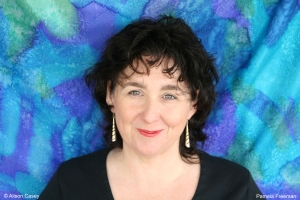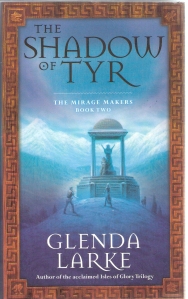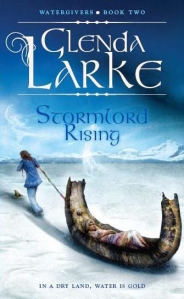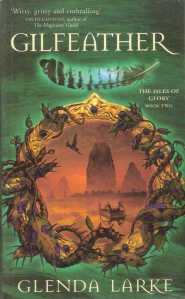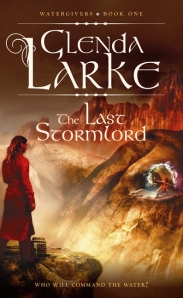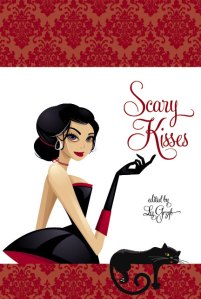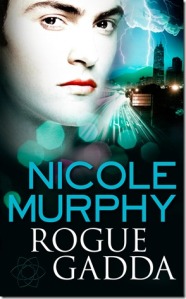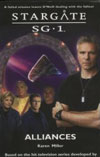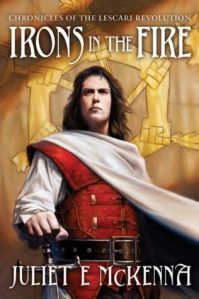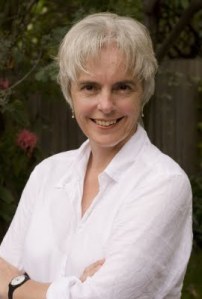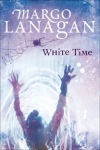As the next of my series featuring fantastic female fantasy authors (see disclaimer) I’ve invited the sweet but sharp Tansy Rayner Roberts to drop by.
Watch out for the give-away question at the end of the interview.

Q: Your story Siren Beat published by Twelfth Planet Press won the Washington Association Small Press Short Fiction Award. This must have come as a delightful surprise. Can you tell us a little about Siren Beat, and Twelfth Planet Press which has taken the unusual step of publishing back-to-back novellas?
 The win was absolutely wonderful and completely out of the blue. I’m only sorry I wasn’t able to collect the prize in person. Siren Beat came from me wanting to create an urban fantasy which wasn’t just Australian in tone but uniquely Tasmanian. We have a very different landscape in Hobart to anywhere else in the country, and I wanted to steer away from more common monsters from the genre such as vampires and werewolves. Which is how I ended up with my guardian, Nancy Napoleon, whose job it is to guard her city against creatures from water mythology. It occurred to me that, in a world where each culture’s unique myths and legends were real, the ocean itself would be one hell of a chaotic melting pot. Siren Beat was the first Nancy adventure, and I’m going to be continuing her story in novel form.
The win was absolutely wonderful and completely out of the blue. I’m only sorry I wasn’t able to collect the prize in person. Siren Beat came from me wanting to create an urban fantasy which wasn’t just Australian in tone but uniquely Tasmanian. We have a very different landscape in Hobart to anywhere else in the country, and I wanted to steer away from more common monsters from the genre such as vampires and werewolves. Which is how I ended up with my guardian, Nancy Napoleon, whose job it is to guard her city against creatures from water mythology. It occurred to me that, in a world where each culture’s unique myths and legends were real, the ocean itself would be one hell of a chaotic melting pot. Siren Beat was the first Nancy adventure, and I’m going to be continuing her story in novel form.
As for Twelfth Planet Press, they picked up my story (which was orphaned from an anthology that didn’t come to pass) and paired it with a fantastic piece by World Fantasy Award winner (and Doctor Who writer) Rob Shearman, which completely delighted me. I really like slender volumes, there’s something quite enticing about them, and Twelfth Planet have turned the old ‘Ace Doubles’ format into a shiny 21st Century product.
Q: You’re not a newcomer to winning awards, having started your career by winning the George Turner award with a book that you wrote when you were 19, Splashdance Silver. I believe the rights have reverted to you. Are you going to release this book and its sequel Liquid Gold as an e-book? (I read an article saying you’d be crazy not to make your back-list work for you by selling books from your web site).
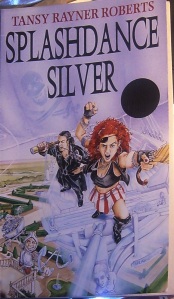 Whoever wrote that article must have a lot more spare time than I do!
Whoever wrote that article must have a lot more spare time than I do!
I think about this from time to time, as I still get emails from readers who have come across the Mocklore books (not sure how, libraries maybe?) and while the market for humorous fantasy is no better than it was ten years ago, Splashdance Silver and its sequels have a girlie YA sensibility that I think could probably find an audience. Most of the fanmail I receive from those books is from teenage girls, then and now! But my heart sinks a little at the thought of it, too. I have so much in my life to juggle, between writing, running a small business, raising two small girls, and publicising the current books I have out. Do I really want to set myself up as a self-publisher? Even without printing overheads I’d have to think about editing, proofing, figuring out how to produce an e-book that doesn’t look like hell (harder than you think!) and it just makes me tired to think about it.
There’s also the thing where this is old work – and while I still have strong affection for Mocklore, it’s not anything like what I’m writing now. I’m not saying never ever, but right now I’d far rather look to the future than delve back into my past.
Q: Galactic Suburbia is a series of podcasts to quote: ‘Alisa, Alex and Tansy bring you speculative fiction news, reading notes and chat from the galactic suburbs of Australia.’ You seem to be having a lot of fun with this. How did you get started doing podcasts?
 I started listening to podcasts about two years ago and it honestly changed my life. It happened around the time that I was becoming completely disillusioned with radio, and I was delighted to find that I could download a whole bunch of cool people (from all over the world) talking about subjects that I actually care about (mostly spec fic publishing, Doctor Who and Arsenal football, if you’re interested!). I was also fascinated by the communities that emerged from groups of similarly themed podcasts – the Doctor Who podcasting community is brilliant for this, they are all so supportive of and interested in each other, and it reminded me of what I love about the SF community and the blogoverse.
I started listening to podcasts about two years ago and it honestly changed my life. It happened around the time that I was becoming completely disillusioned with radio, and I was delighted to find that I could download a whole bunch of cool people (from all over the world) talking about subjects that I actually care about (mostly spec fic publishing, Doctor Who and Arsenal football, if you’re interested!). I was also fascinated by the communities that emerged from groups of similarly themed podcasts – the Doctor Who podcasting community is brilliant for this, they are all so supportive of and interested in each other, and it reminded me of what I love about the SF community and the blogoverse.
Then Sofanauts ended, which made me so sad! This was a side project by Tony C Smith of Starship Sofa in which he and several interesting people would sit around and chat about publishing, science fiction, and the spec fic “scene.” I loved it, and got several other people addicted to it. Tony did say that if anyone else wanted to take up the Sofanauts brand, he’d be happy to see that happen, and I talked about it with Alisa and Alex. We seriously considered becoming the New Sofanauts (like the old Sofanauts but in mod 70’s funky gear) but decided that anything we did would be so different that it might as well be a different show. So we made it our own!
Galactic Suburbia has just celebrated its first birthday, and we love it. It’s so cool having a chance to talk to Alisa and Alex about books, publishing, science fiction and feminism every fortnight. I don’t feel nearly as far away from everyone, and it’s been utterly squeeful to have so many people listening, commenting and becoming invested in what we have to say. The really exciting thing is that the last year has seen a bunch of other Australian SF podcasts starting up, many of them crediting us with inspiring them, and so we have a community of back-and-forth, all covering different (but often overlapping) areas of interest.
Q: Your Creature Court Trilogy is being published by Harper Collins, Voyager. I’ve read Power and Majesty and loved it. Now Shattered City (book Two) will be released. The premise for this series is really interesting. It combines ancient Rome with the 1920s in a dark urban fantasy with shapeshifters. What led you to combine these two elements?
 It wasn’t quite that organised, actually! I just started writing, and poured in lots of things that I love. The Ancient Roman calendar of festivals has been deeply buried in my subconscious since I did my Honours degree on women in Roman religion, and I’ve wanted to write a story about dressmaking in the 1920’s since… well, since The House of Elliot did it first, and the shapechangers pretty much just leapt off the page and started talking to me. When I was teaching creative writing I would often advise students to create a ‘list of awesome’ – basically a list of things they love and are interested in or obsessed by, to fuel their stories. I never did that for Creature Court, and yet somehow it’s packed with many of my favourite things.
It wasn’t quite that organised, actually! I just started writing, and poured in lots of things that I love. The Ancient Roman calendar of festivals has been deeply buried in my subconscious since I did my Honours degree on women in Roman religion, and I’ve wanted to write a story about dressmaking in the 1920’s since… well, since The House of Elliot did it first, and the shapechangers pretty much just leapt off the page and started talking to me. When I was teaching creative writing I would often advise students to create a ‘list of awesome’ – basically a list of things they love and are interested in or obsessed by, to fuel their stories. I never did that for Creature Court, and yet somehow it’s packed with many of my favourite things.
Q: Central to the trilogy is the friendship of three women. This is unusual in the urban fantasy genre, which tends to have strong female ‘kick-butt’ characters. Your characters aren’t the stereotypical urban fantasy types, one is a dressmaker, another makes garlands and the third is a florister. (Their city has a lot of festivals, LOL). Did you set out to write a story about the friendships that are central to women’s lives, or did it just evolve?
 The friendship of those three was an integral part of the story – Velody, Delphine and Rhian are craftswomen because I love to sew and make things, but also because having a craft was historically a way for women to acquire independence. It was really important to me that my protagonist have a job, and one she cared about, to balance out the crazy I was about to hurl into her life. So much fantasy puts the heroes in the position where saving the world is their job, and I wanted to address the idea that this wasn’t an overly healthy situation to be in. Velody’s friends are what she has instead of a family, and I love the complex relationship that these three women have woven around themselves. They are very supportive of each other, but there are fractures there if you poke at it (which of course I do, repeatedly) – they are quite enabling of bad habits in each other as well as being supportive when the chips are down.
The friendship of those three was an integral part of the story – Velody, Delphine and Rhian are craftswomen because I love to sew and make things, but also because having a craft was historically a way for women to acquire independence. It was really important to me that my protagonist have a job, and one she cared about, to balance out the crazy I was about to hurl into her life. So much fantasy puts the heroes in the position where saving the world is their job, and I wanted to address the idea that this wasn’t an overly healthy situation to be in. Velody’s friends are what she has instead of a family, and I love the complex relationship that these three women have woven around themselves. They are very supportive of each other, but there are fractures there if you poke at it (which of course I do, repeatedly) – they are quite enabling of bad habits in each other as well as being supportive when the chips are down.
I love myself a kick butt heroine in the mould of Ripley or Starbuck or Parrish Plessis but for this particular book I was interested in the juxtaposition of giving superpowers to someone who wasn’t at all cut out for violence or leadership. I also wanted a mature female protagonist – and it’s kind of sad that Velody would count as mature, being 26, but I’ve written teen girl and early twenties girl protagonists, and I was interested in exploring someone who was a bit more adult and settled and experienced before she starts having to deal with power and naked cat people falling out of the sky. Buffy is a great hero of our age, but I can’t help thinking she had it easy in many ways because she discovered her destiny when she was young enough to adapt. Having to explain to your friends that you’re busy saving the world is a bit more embarrassing when you’re an adult!
Q: Following on from that last question, your book contains descriptions of gorgeous clothes which, I should add, are pertinent to the story. Have you thought of teaming up with a fashion designer to release a line of romantic-sexy clothes for males and females? Do you design and make clothes?
Ohhh Rowena this is not the first time you have put this to me, and I would adore to do such a project. Sadly I don’t know anyone who is into fashion design who might take it on!
I love fabrics, and I love to sew, though dressmaking is not my superpower. I work in quilting and textile arts mostly. I even have a Creature Court crazy quilt I have been working on and really need to get back to… I love and admire beautiful clothing, but my inability to sew a straight seam is somewhat embarrassing. I am also allergic to sewing machines (though not, strange to say, quilting machines which are big and shiny and go vROOOOM)
Q: Of course The Shattered City isn’t the only book release you have coming out this year. Tell me about Love and Romanpunk.
This is a book that I am immensely proud of, published by Twelfth Planet Press as one of their ‘Twelve Planets’ short story quartets by twelve Australian women writers. It’s a very exciting and challenging project to be part of. My book will be released in May.
Love and Romanpunk is a set of stories set in what I like to call the ‘Agrippinaverse,’ an alternate version of our world in which the Caesars were a family cursed by all manner of strange mythological beasts, Mary Wollstonecraft the younger ran off with a far more dangerous poet than Percy Shelley, Australia built their own replica Roman city in the middle of the bush, and Caligula’s daughter turned out to be a two hundred year old monster-hunting bloke in a funny hat.
I’m well aware that adding -punk to anything as a label for a literary movement is well past its sell by date, but did we have to get bored of the concept before we got to Romanpunk? It started out as a fun challenge to people – if you’re going to add -punk to everything, why not something that *I’m* interested in? I asked the universe for Romanpunk and no one wrote it for me, so of course I had to write it myself. The term also happens to sum up the squirmy discomfort I feel as a classicist from taking real history, smashing it to bits, and adding manticores. I have always loved the idea of future societies which are obsessed with different parts of history than we are – and in my perfect future, everyone is as obsessed with Ancient Rome as I am!
Q: You live in Tasmania with your partner and ‘two alarming’ little girls. <grin> You have a PHD in the classics. You’ve edited for ASIM, New Ceres, and Shiny. Plus you sell the Deeping Dolls. How do you fit everything in?
 See my seams? They are bursting! The small press work had to go, and did round about the time that I sold Power and Majesty. I enjoy editing but it’s not my grand passion – and it takes too many of the same brain cells that I need for the novel writing. It would have to be a hugely enticing project to lure me back in that direction. The PhD is over now, and you’ll notice the extreme lack of fiction publications during the 7 years it took me to complete? These days, I am just juggling three or so jobs, which suits me just fine!
See my seams? They are bursting! The small press work had to go, and did round about the time that I sold Power and Majesty. I enjoy editing but it’s not my grand passion – and it takes too many of the same brain cells that I need for the novel writing. It would have to be a hugely enticing project to lure me back in that direction. The PhD is over now, and you’ll notice the extreme lack of fiction publications during the 7 years it took me to complete? These days, I am just juggling three or so jobs, which suits me just fine!
I work from home, I get some daycare hours, and I juggle madly. I learned not to be precious about when and where and how to write. I learned to write faster. My daughters have learned that Mummy’s laptop is with her at all times! I also get great support from my parents, who free up a few precious half days each week for me. It’s frustrating that I used to write slow like a snail back when I had no other real commitments, and now I KNOW I could write three books in a year I actually have to settle for far less than that because of the cute little baby doing things like learning to roar like a lion, which is utterly distracting, and should be.
I’m terribly lucky to have what I do, and the opportunities I have, but I’m no superwoman. I’ve learned not to be too hard on myself and to let things go that are too much – recognising how much is too much is a vital skill! I’ve had to suck it up and sacrifice my pride to ask for deadline extensions, and to be realistic about what I can manage.
I have a secret horror that once my second child is in school, I will have forgotten how to deal with having days to myself, and will just mooch around playing games and watching DVDs instead of WRITE WRITE WRITE.
Q: You review a lot of YA fiction. Are you planning to write a YA series?
Always planning! I have a YA fairy book that I am still in love with that I have been planning to write for the last 4 years or so, and never quite getting to. I have co-written a mainstream soccer novel with a friend in Sweden which has been stuck in rewrite hell for about a year and a half because of lack of time on my part – I’ve had deadline after deadline basically since I had my baby, who just turned 18 months. Lots of other ideas – so yes, I’d love to, at some point. I also long to sit down and write a middle grade series about girl superheroes which has been steaming away at the back of my head for a while.
[youtube=http://www.youtube.com/watch?v=-h18RVylmXw]
Q: I was prompted to start this series of interviews because there seems to be a perception in the US and the UK that fantasy is a bit of a boy’s club. Do you think there’s a difference in the way males and females write fantasy?
I always blink madly at that because as you know, in Australia fantasy has so many successful female authors, and there is a perception here that women rule the fantasy roost, though I get cranky when people suggest it’s unreasonably dominated by women. There are plenty of successful male authors here too! Likewise, I’m always a bit bewildered when people start listing fantasy writers and mostly come up with men. It does seem like the Big Name authors from the US and UK are just that bit big nameyer than the women – and I have certainly heard that men get better advances, etc. How much does that suck?
I think a big part of it is about which end of the audience you respect. It’s a shame that publishers do tend to get tunnel vision at times and point their books firmly at one gender or another (which may or may not be the same as the gender of the author – more often than not, I’d say) but it’s incredibly hard to market books universally – to find covers that appeal to women without alienating men, or vice versa. Some areas of the genre are certainly more attuned to one gender or another – or more precisely to what a couple of guys in suits THINK one gender or another wants to read – and sometimes that’s going to be good for sales and sometimes bad. There are plenty of women who turn about face if they perceive anything remotely “girly” on a book cover, just as there are plenty of male readers who are going to roll their eyes at a gritty militaristic cover.
Hmm and I just totally answered the question as if it was about marketing and not writing, didn’t I!
I remember being floored once when a man told me to my face that he wouldn’t read by book because he wouldn’t read books by women. It was about twelve years ago and when I hear it, my head explodes all over again. Having said that, I have mostly assumed that my recent books would appeal more to a female audience than a male – because, you know, clothes, and girl cooties, and slashy smut in between all the adventures and world-saving. I’ve never been more pleased to be wrong in my life – I have lots of male readers, and not just people I know. Hooray!
Q: Following on from that, does the gender of the writer change your expectations when you pick up their book?
I tend to read more fantasy by women because I perceive it as being more likely to have elements I enjoy – and if pressed I would say things like multiple female characters, and the female gaze, and a more complex attitude towards romance and sexuality, and a greater focus on social rather than military concerns. I am not saying that women can’t write action packed gore fests or that men can’t write sensitive court politics – some of my best writers are men, you know! – but I have been reading and analysing my own reading for a really long time and statistically I know I’m more likely to enjoy a book by a female author.
Partly because of this, I am far more likely to pick up a book by a new author if she is a woman, and it takes a lot more to make me pick up books by men, especially in the fantasy field. But I am well aware of my biases and I do like to challenge them from time to time. I do work quite hard to make female-authored fantasy visible, through reading and blogging and podcasting, because it seems to me that when it comes to criticism, awards and other recognition, it’s often women’s books that get forgotten about. But mostly I do it because I love to share books that I enjoy.
Q: And here’s the fun question. If you could book a trip on a time machine, where and when would you go, and why?
Need you ask? Ancient Rome! The actual year is a tricky one, though, as I might have to choose between finding Agrippina’s lost autobiography and attending the wedding of Augustus and Livia. No, wait. I know the exact night that I want! It would have to be the party at Caesar’s house, when Publius Clodius dressed up as a flute girl to gate-crash the rites of the Bona Dea. If he could make it past their slack security in a frock and a bad wig, I can certainly make it over the threshold, and not only could I meet Aurelia (whom I named my daughter after), I could find out what they used the snakes and honey for!
Catch up with Tansy on Twitter @tansyrr
Tansy’s Writing Blog – http://tansyrr.com
Crunchy SF Feminist Podcast – http://www.galacticsuburbia.com
Pendlerook Designs, Tasmanian Hand-painted Dolls – www.pendlerook.com
Steampunk costumes are very popular. In the Creature Court series tansy combines fashions of the 1920s with Ancient Rome, here’s the give-away question:
What’s your favourite time period for fashion and why?
 Q: Leading on from there you have three adult/grownup fantasy books published with Orbit books, The Castings Trilogy, and a new stand-alone novel, Ember and Ash. Was this a big break away from your children’s writing, or did it feel inevitable, like something you were always going to do?
Q: Leading on from there you have three adult/grownup fantasy books published with Orbit books, The Castings Trilogy, and a new stand-alone novel, Ember and Ash. Was this a big break away from your children’s writing, or did it feel inevitable, like something you were always going to do? Q: I was prompted to start this series of interviews because there seems to be a perception in the US and the UK that fantasy is a bit of a boy’s club. Do you think there’s a difference in the way males and females write fantasy?
Q: I was prompted to start this series of interviews because there seems to be a perception in the US and the UK that fantasy is a bit of a boy’s club. Do you think there’s a difference in the way males and females write fantasy?
